ADAM17 Monoclonal / Alexa Fluor 700 / 136133
Product Details
| Description | Human TACE/ADAM17 Cytosolic Domain Alexa Fluor 700-conjugated Antibody | |
|---|---|---|
| Conjugate | Alexa Fluor 700 | |
| Clone | 136133 | |
| Target Species | Human | |
| Applications | ICS | |
| Supplier | R&D Systems | |
| Catalog # | Sign in to view product details, citations, and spectra | |
| Size | ||
| Price | ||
| Antigen | ||
| Host | ||
| Isotype |
About ADAM17
This gene encodes a member of the ADAM (a disintegrin and metalloprotease domain) family. Members of this family are membrane-anchored proteins structurally related to snake venom disintegrins, and have been implicated in a variety of biologic processes involving cell-cell and cell-matrix interactions, including fertilization, muscle development, and neurogenesis. The encoded preproprotein is proteolytically processed to generate the mature protease. The encoded protease functions in the ectodomain shedding of tumor necrosis factor-alpha, in which soluble tumor necrosis factor-alpha is released from the membrane-bound precursor. This protease also functions in the processing of numerous other substrates, including cell adhesion proteins, cytokine and growth factor receptors and epidermal growth factor (EGF) receptor ligands, and plays a prominent role in the activation of the Notch signaling pathway. Elevated expression of this gene has been observed in specific cell types derived from psoriasis, rheumatoid arthritis, multiple sclerosis and Crohn's disease patients, suggesting that the encoded protein may play a role in autoimmune disease. Additionally, this protease may play a role in viral infection through its cleavage of ACE2, the cellular receptor for SARS-CoV and SARS-CoV-2. [provided by RefSeq, Aug 2020]
This gene encodes a member of the ADAM (a disintegrin and metalloprotease domain) family. Members of this family are membrane-anchored proteins structurally related to snake venom disintegrins, and have been implicated in a variety of biologic processes involving cell-cell and cell-matrix interactions, including fertilization, muscle development, and neurogenesis. The encoded preproprotein is proteolytically processed to generate the mature protease. The encoded protease functions in the ectodomain shedding of tumor necrosis factor-alpha, in which soluble tumor necrosis factor-alpha is released from the membrane-bound precursor. This protease also functions in the processing of numerous other substrates, including cell adhesion proteins, cytokine and growth factor receptors and epidermal growth factor (EGF) receptor ligands, and plays a prominent role in the activation of the Notch signaling pathway. Elevated expression of this gene has been observed in specific cell types derived from psoriasis, rheumatoid arthritis, multiple sclerosis and Crohn's disease patients, suggesting that the encoded protein may play a role in autoimmune disease. Additionally, this protease may play a role in viral infection through its cleavage of ACE2, the cellular receptor for SARS-CoV and SARS-CoV-2. [provided by RefSeq, Aug 2020]
About Alexa Fluor 700
Alexa Fluor™ 700 (AF700, Alexa 700) has an excitation peak at 702 nm and an emission peak at 723 nm, and is spectrally similar to iFluor® 680 (ATT Bioquest) and iFluor® 700 (ATT Bioquest). Alexa 700 is commonly used in Flow Cytometry and is similar in size, brightness and application to iFluor® 700 and Vio® R720.
Alexa Fluor™ 700 (AF700, Alexa 700) has an excitation peak at 702 nm and an emission peak at 723 nm, and is spectrally similar to iFluor® 680 (ATT Bioquest) and iFluor® 700 (ATT Bioquest). Alexa 700 is commonly used in Flow Cytometry and is similar in size, brightness and application to iFluor® 700 and Vio® R720.
Experiment Design Tools
Panel Builders
Looking to design a Microscopy or Flow Cytometry experiment?
Validation References
Reviews & Ratings
| Reviews |
|---|
Looking for more options?
458 ADAM17 antibodies from over 25 suppliers available with over 42 conjugates.





